We are celebrating the release of THE LONE RANGER on DVD, Blu ray and Digital on October 30 by giving away a few copies of the blu ray plus a very nice chat with Mr Tom Wilkinson who you would have seen in movies such as The Full Monty, The Debt, Batman Begins and one of my favorites Eternal Sunshine of the Spotless Mind. In THE LONE RANGER he plays Latham Cole, a railroad magnate and visionary who is a driving force behind the completion of the Transcontinental Railroad.
Q: What was it about “The Lone Ranger” that attracted you to this project?
A: The Lone Ranger is part of my background. If you’re my age you can remember the TV series, and before that you can remember the comic books, which I was kind of brought up on, being brought up in North America. And, of course, I remember the TV series starring Clayton Moore and Jay Silverheels, and I never missed that. I wanted to have the opportunity of working with Gore [Verbinski], and just the prospect of doing something that big and that complicated was attractive.
Q: What was it about this version when you read the script that caught your imagination?
A: I just thought it was a very, very interesting take. The original story, as I remember, is that he’s just left for dead by these people and has to retain his secret identity so that they don’t find out who he is, and there’s sort of an element of that in this story. But this one is much more complicated, and the relationship between the Lone Ranger and Tonto is more psychologically nuanced than it is in the comic books. I was attracted to that.
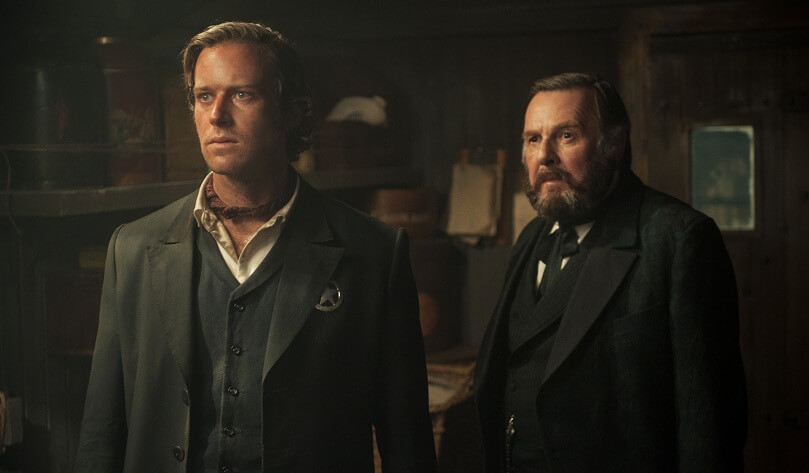
Q: How would you describe the story of the film?
A: The central moment of the movie is the developing relationship between the Lone Ranger and Tonto, and this is played out against the background of the expansion of the United States into the West, and the not-always smooth transition that meant.
Q: How would you describe your character in the film?
A: I play the character called Latham Cole and he is, in a certain sense, one of the fathers of this country as it is today. He was sort of a venture capitalist who had a vision of the United States united by the railroad. So he is a railroad builder. But this isn’t just simply an opportunity to make money though, it’s also, as far as my guy is concerned, part of a vision, and I think that the people who built this country were visionaries in a certain sense.
It wasn’t just simply doing things piecemeal, but the sense that there was potential for a unified greatness in this country, which they wanted to hasten. So I think that’s the guy I play. Latham Cole is not always over-fastidious about how he achieves what he needs to achieve but I guess that’s always been the case, that people who have the big vision are not that reluctant to tread upon the principles or the legal rights, perhaps, of other people.
Q: Is there more to Latham Cole’s character than meets the eye?
A: As I said before, this is a man who is not over-fastidious about how he gets what he wants to get, and there is a certain sort of moral ruthlessness about him, in the sense that he will trample on people who attempt to get in his way. Now I have to see that as an actor in terms of a positive thing. In terms of people watching it, they may see that this is not particularly a nice guy at all.
In fact, he’s kind of wholly negative, and certainly nefarious, and certainly what he does, in every sense, is illegal. But he has to do what he has to do, and for him, at least, the fact that he does, as I say, trample on people’s rights or kill people to get what he wants, that’s the lesser of the two. The big thing is this vision he has with the railroad.
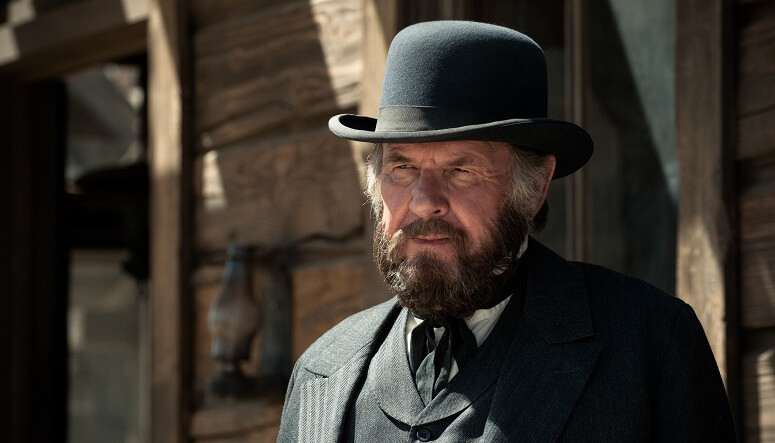
Q: How would you describe Butch Cavendish, and what was the relationship between the two characters?
A: Latham Cole maintained an aura of respectability. We don’t know enough about him to know how dense that aura is but nonetheless he feels he needs to present himself as this selfless builder of the United States; whereas, Butch Cavendish is the exact opposite. He’s the most evil man that ever walked the earth, and although, of course, at the beginning of the movie Latham Cole purports to find the Butch Cavendishes of this world, it turns out later on that they are in league. They are, as it were, two sides of the same coin, and it’s an interesting prism to view the ambiguities that are in the script. On the other hand this, on the other hand that. It’s interesting.
Q: Cole and Cavendish have some wonderful scenes, how did you enjoy working with William Fichtner?
A: All the scenes are necessarily quite short, so we haven’t quite had the sort of wonderful kind of relationship you get. I like him a lot. I think he’s a wonderful actor. I think he looks great and he’s bad to the bone. All the things that he’s meant to be, I think he is and it’s been a great pleasure getting to know Bill and getting to know his character.
Q: What was the partnership with Captain Fuller like?
A: It is an interesting one. Captain Fuller, as far as I can tell, is a sort of legitimate army officer, but is easily manipulated, and somebody like Latham Cole will always, instinctively find that bit in which anybody else can be manipulated. Rather than out and out force, which he’s not afraid to use, if he can find some weakness in a person that he can trade upon, then he will do so. In the case of Fuller, there is a certain, on the surface, kind of naiveté about his worldview that Latham Cole is able to exploit.
Q: What was it like working with Barry Pepper and was it the first time?
A: No, this is at least the third time I’ve worked with Barry. The first one was a movie that didn’t get released and then a couple years ago we did “The Kennedys,” together, in which I played his dad. He was Robert Kennedy and I played Joe, so I know Barry very well and I like him a lot.
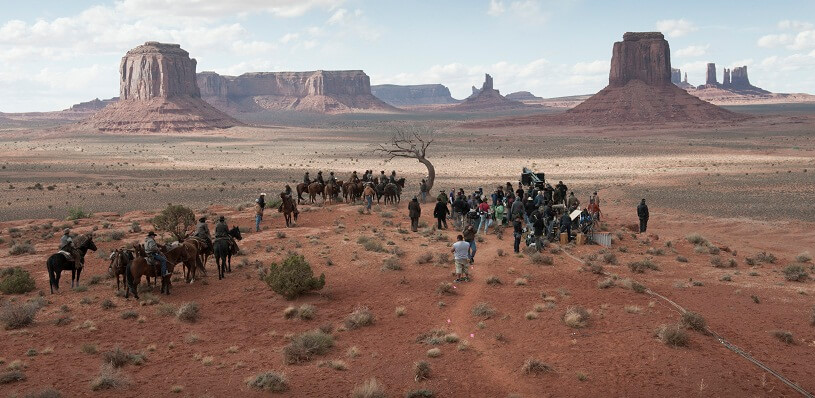
Q: How would you describe the relationship between Cole and Red Harrington?
A: It’s all done by implication. It’s difficult to say, but his relationship with Red Harrington suggests that there have been relations between them that have not been very successful. That’s just something that’s hinted at, we don’t need to go into it any further than that. I’d never met Helena Bonham Carter, of course, so it was very nice to meet her.
Q: What was it like working with Armie Hammer?
A: Armie is a smashing guy. I first came across him in “The Social Network” and I was very impressed by that as a piece of work. I was very impressed by what Armie did, and I think he’s perfect casting for the Lone Ranger, in that sort of sense of moral rectitude which he brings to it, which is very important; slightly funny as well, which is also very important.
Q: You have worked a bit with Ruth Wilson as Rebecca Reid. What’s the interaction between your characters?
A: Almost all our scenes or a lot of them are basically what my character Latham Cole wants to do. It’s never directly stated, but somehow he has this paternal attitude towards Rebecca and her son, which I think is probably a little bit more ambitious sexually than merely taking them under his wing. So it’s a rather peculiar and rather creepy relationship, I have to admit, but it never reaches any sort of spectacular climax. It’s that you just get the sense that he wants to take them over in a not very nice way.
Q: Ruth Wilson has been making quite a name on the London stage. How was it working with her?
A: She’s wonderful and she’s kind of modest. I, unfortunately, haven’t seen either of her award-winning stage performances, but I’m told that they were wonderful. You don’t win an Olivier Award unless you’re really good, and I’m going to take that on trust because what I’ve seen is that she’s wonderful and a very nice person.
Q: How did you respond to the recreation of the American West and has it affected your performance at all?
A: A set in itself doesn’t change your performance. If it’s going to be a bad performance, it’s going to be a bad performance regardless of where you are. But what they’ve created is just mind-blowingly spectacular and the design values and stuff that you see on this movie is just incredible. Incredible! They haven’t been the most comfortable places to be in, for one reason and another, but nevertheless the fact that what they’re going to bring to the movie is endless.
Q: How would you describe working with Gore Verbinski, and how did you find his vision?
A: I find him quite unique in a certain sense, given that this is probably the biggest movie that I’ve worked on, where I got to know how big and complicated and difficult it is to deal with day after day. So the organization of thousands of people and the fact that he can do it with such equanimity is amazing. At no point do you see him fly off the handle or sulk; he just deals with it.
Like all great directors, and I think he is a great director, he won’t compromise and that’s something that can be very often uncomfortable to be around, but nevertheless that’s what makes him who he is. He has a very, very clear image of what he wants to achieve with this film and heaven help anybody who stands in his way.
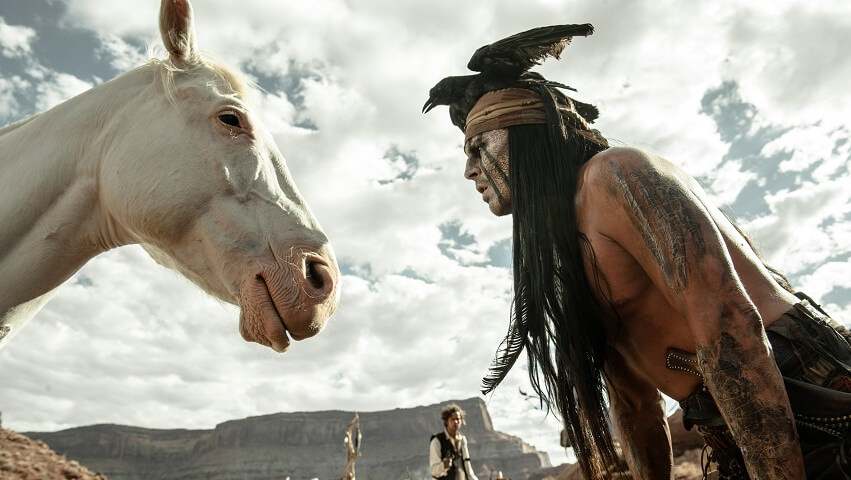
Q: What did you think of the scale of the movie?
A: It’s big and it’s meant to be big, and it’s conceived as big. I look forward to the results. When you make a movie, you have no idea what it’s going to look like and the grandiosity of the vision. You can guess at that, but it’s only when you see it up there, do you think, “Oh, that’s what I was doing for all those months. I get it now.”
Q: How would you describe the tone of the movie?
A: It does have comic elements and touching elements, all that sort of stuff. It is not for me to say at this point how that mixture is going to be decided in the cutting room. So the challenge that Gore Verbinski has is to get this huge epic piece with all sorts of different, conflicting aspects in it and make it into a coherent and entertaining narrative.
At the moment, it’s a mixture of a lot of things, which could all work well together and I suspect they will. But it’s entirely up to him, how he does it, and what decisions he makes then.
Q: What did you think of the look of your character?
A: It’s fantastic when you get all your stuff put together and you look in the mirror and you think that’s a good look for that character; it’s perfect. If they had said, what we’d really like you to do is wear a T-shirt and shorts, and I didn’t have to put a beard on, I think that’s the look I would go for, particularly in the temperatures here, like 90-plus degrees. But you have to sort of grin and bear it. It’s my job. Just sitting around in the shade with a beard on and a three-piece suit isn’t exactly the most onerous job I’m ever going to have to do.
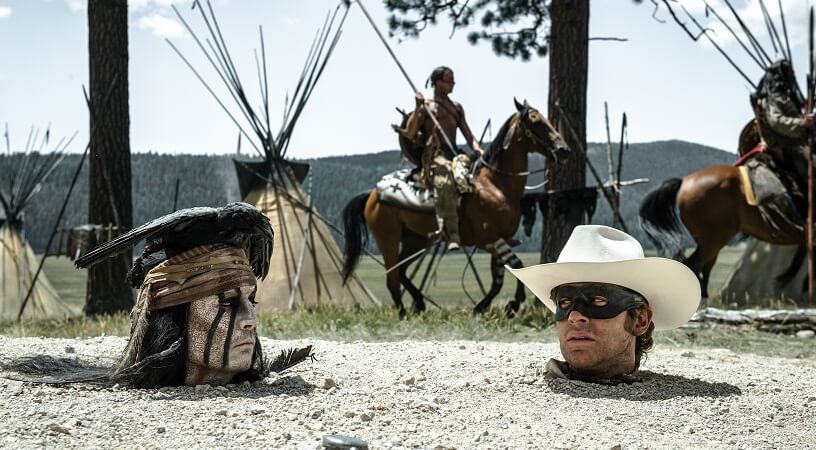
Q: This year marks the 80th anniversary of The Lone Ranger. Why do you think it has had such a long resonance?
A: They’re good stories, sort of knight-in-shining-armor type of thing. It’s not exactly entirely modern or unique; it is a complicated situation. Knight in shining armor, more rectitude, solves the day. The relationship between Tonto and the Lone Ranger in any of the versions, the comic book version, the TV version that we saw, and this version gives it a sort of uniqueness, which, I suppose, accounts for its lasting appeal, in a certain sort of way. We will watch the movie and we will see if it’s an enduring appeal. I’m sure it will be.
Q: You’ve been around the trains quite a bit. What has that been like and what challenges did that present?
A: I’ve done lots of acting in cars and I’ve done acting on tractors and stagecoaches but not on trains. People make it very comfortable for me, though. Sometimes I think, I want this to stay on the rails; I don’t want this to fall over. Sometimes there were chasms on either side of where we were driving, so I didn’t want to fall off. But nevertheless, people have been very good about making it safe and comfortable.
THE LONE RANGER lands on DVD, blu ray and digital on October 30! For a bit of a refresher take a look at a clip from the film below.

